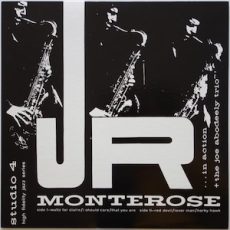
Requisites
In Action ~ J.R. Monterose and The Joe Abodeely Trio | By Eddie Carter
My next record from the library up for discussion is a little-known but highly sought-after 1964 studio album by tenor saxophonist J.R. Monterose and The Joe Abodeely Trio. In Action (Studio 4 SS 100) was recorded during a ten-month engagement at Iowa’s only jazz club at the time, The Tender Trap, which Abodeely owned. This album, with its historical significance in Monterose’s discography, is a unique release. There were only two hundred fifty original LPs made; fans could only purchase them at the cloakroom of the Cedar Rapids Jazz Club, and an original Mint pressing would cost a collector four figures or more. He was born Frank Anthony Peter Vincent Monterose, Jr. and the initials J.R. come from Jr.
Monterose began playing the clarinet at age thirteen, then took up the tenor sax two years later after hearing tenor man Tex Beneke, who was a member of the Glenn Miller Orchestra. The trio consists of Dale Oehler on the piano, Gary Allen on bass, and Joe Abodeely on drums. My copy is the 1983 U.S. Mono reissue (V.S.O.P. Records V.S.O.P. #1), a small record label known for its high-quality reissues of jazz LPs from the fifties and sixties. Waltz For Claire is a very pretty tune by J.R., starting with a cheerful theme. He continues with a blissful opening statement by the saxophonist, who communicates his feelings about the young lady with a charming performance. Dale takes the listener on a relaxing joyride in the closing solo ahead of the theme’s restatement and close.
I Should Care by Alex Stordahl, Paul Weston and Sammy Cahn premiered in the 1945 film Thrill of a Romance. The quartet begins with Monterose’s sensual sound of his tenor sax, delivering a delicate melody and then handling each note of the opening statement with tender, loving care. Oehler follows with a passionate performance packed with plenty of feeling before J.R. repeats the theme. That You Are, Monterose’s next tune, is a creative reimagining of All The Things You Are, a popular jazz standard. Monterose builds on the changes of the original with an upbeat, bright, bouncy theme. J.R. puts his thoughts into expressive verses first. Dave provides the exclamation point in an energetic solo, leading to the ending theme and fadeout.
The tempo moves upward to kick off the second side with Red Devil by Monterose, beginning at a brisk beat for the quartet’s theme. The saxophonist leads off with a flawless opening solo, and then Oehler dazzles on the finale with an imaginative flair. Lover Man by Jimmy Davis, Roger Ramirez, and James Sherman begins with a pensive melody by the foursome, segueing to J.R.s intimately warm interpretation. Dave responds with a delicately elegant and beautiful presentation. Monterose closes with a few final comments of exquisite softness anchored by Gary and Joe’s subtle supplement ahead of the tender close.
The final track is Monterose’s Herky Hawks, an uptempo tune that deceptively starts with a two-instrument conversation between the saxophonist and pianist at a slow tempo. This musical dialogue sets the stage for the rest of the piece. The discussion gradually builds in intensity, leading to a swift-moving speedy theme. This tune is a scorcher from the start, and the saxophonist turns the heat way up in the first of two solos. Dave attacks the next reading with aggressive fierceness, and then J.R. ends the album with a blistering final performance preceding the climax.
The recording engineers on this reissue are Dimitri Sotirakis and Myron Schiebel. Although there’s no information on either engineer, their work speaks volumes. They’ve done an excellent job with the sound quality of this album, bringing out the richness and depth of the music. The excellent sonics throughout the treble, midrange and bass complement the inspired performances by J.R. Monterose and The Joe Abodeely Trio, making In Action an underrated release deserving a spot in your jazz library!
~ Lover Man – Source: JazzStandards.com
~ I Should Care – Source: Wikipedia.org
© 2024 by Edward Thomas Carter
More Posts: choice,classic,collectible,collector,history,instrumental,jazz,music,saxophone
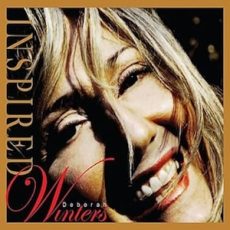
Daily Dose Of Jazz…
Deborah Winters was born on September 15, 1966 in San Francisco, California and her childhood was immersed in music and dance with first influences from her drummer father, and a ballet dancer mother with the Oakland Metropolitan Ballet Company. Developing a passion for music, dance and theatre at a very early age, big band sounds rang through the house.
Moving around the country with her family as an adolescent, Deborah studied voice and guitar. She became influenced by singer/songwriters James Taylor, Joni Mitchell and Rickie Lee Jones. Her desire to sing and play the guitar led her to playing clubs and into the studio to record a few of her own compositions before graduating.
Her musical palate expanded to include jazz standards and contemporary musical forms. Performing around San Francisco she would go on to work with Tony Williams, Bobby McFerrin and his Voicestra group, Frank Martin, and Jose Neto. She released her debut recording, live “in session” on her Pure Passion Productions label. Her sophomore release Inspired, exhibits her introspective side. Her third release centers on big bands, traversing the expanse of jazz history.
Vocalist Deborah Winters continues to search for new ways to express her music in her evolution as a singer, guitarist and songwriter.
More Posts: bandleader,history,instrumental,jazz,music,vocal
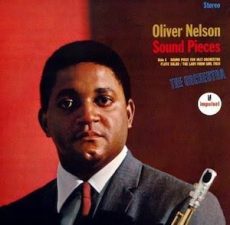
Requisites
Sound Pieces ~ Oliver Nelson | By Eddie Carter
My next record from the library is by Oliver Nelson, one of jazz’s finest arrangers, composers, and multi-instrumentalists, which is too good to leave sitting on the shelf. Few performances on LP ever reached the heights of his 1961 release, The Blues and The Abstract Truth, producing his biggest hit, Stolen Moments. Sound Pieces (Impulse A-9129/AS-9129) is one that did, and in the process, became one of the best albums in Nelson’s discography. What sets Sound Pieces apart is its unique combination of a large ensemble for three works of orchestral jazz on Side One and a quartet in a more intimate setting on Side Two. My copy is the original 1966 US Stereo release.
The personnel on this date are an all-star ensemble. John Audino (tracks: A1 to A3), Bobby Bryant (A1), Conte Candoli, Oliver Mitchell (A1 to A3), Al Porcino (A2, A3) on trumpet; Bill Byers (A2, A3), Dick Noel (A1), Ernie Tack (A1 to A3) on trombone; Red Callender (A2, A3) on tuba; Bill Hinshaw, Richard Perissi (A1 to A3) on French horn; Gabriel Baltazar Jr. and Bill Green (A1 to A3) on alto sax; Plas Johnson, Bill Perkins (A1 to A3) on tenor sax; Jack Nimitz (A1 to A3) on baritone sax; Oliver Nelson (A1 to B3) on soprano sax; Gabriel Baltazar Jr., Bill Perkins (A2, A3) on clarinet; Steve Kuhn (B1 to B3), Mike Melvoin (A2, A3) on piano; Ray Brown (A2, A3), Ron Carter (B1 to B3) on bass; Shelly Manne (A2, A3), Grady Tate (B1 to B3) on drums.
Sound Piece For Jazz Orchestra is an unforgettable story of music told in two main themes: the first one is a calm state of tranquility. The second is a searing portrayal originally written for The Stuttgart Radio Dance Band in 1963. The song opens with the bass clarinets sounding a commanding call and an exceptional utilization of brass and winds to announce the majestic chorus with strong statements. Originally written for alto saxophone, Oliver is featured on soprano sax and is the song’s only soloist in both sections. When the pace slows down to a softer tempo, he delivers a thoughtfully sensitive interpretation, caressing each phrase with the clarinets and horns discreetly in the background, culminating in a tender finale. The rhythm section shifts the song back to uptempo for the orchestra to restate the melody, stepping aside for Nelson, who gives an intense workout on the closer before the stunning finale.
Flute Salad is an original by Oliver Nelson that, as the title suggests, places the flutes in front, leading the orchestra in the animated opening and ending melodies. Conte Candoli is the featured soloist, and his muted horn delivers an air of assurance that flows sonorously with the brass section in support. The Lady From Girl Talk by Oliver was written for Actress Virginia Graham, who hosted Girl Talk, a syndicated program using this tune as her theme. The trombones announce the introduction before evolving into the orchestra’s full-bodied melody. Mike Melvoin begins a taut opening solo of rhythmic joy, illustrating his nimble hands at work. Oliver follows, his soprano moving gracefully with soulful precision on the closer for a compelling reading that is especially impressive.
The Shadow of Your Smile by Johnny Mandel and Paul Francis Webster is also known as Love Theme From The Sandpiper. Steve, Ron, and Grady join Oliver in presenting a Bossa Nova version, opening with the introduction as if the quartet is playing the standard at a slow tempo. The mood moves upward to a medium beat for the melody with an energetic swing led by Nelson. Steve charges the opening statement with mild energy and agile phrases, exhibiting the cohesive harmony between himself, Carter, and Tate. Oliver closes with an affectionate performance of deep emotion, rich harmony, and warm phrasing that, to these ears, captures the essence of expressing the love the lyrics depict.
Patterns is an uptempo original that first appeared in Oliver’s 1966 Book, Patterns For Improvisation (Jamey Abersold), a collection of improvisational jazz patterns in various meters and feels that spells out some of the basic building blocks of the jazz language. It is the most adventurous and interesting tune on the album, beginning with a thematic statement that the quartet takes as far as it will go. The opening solo by Nelson is well-developed. Kuhn heightens the mood by supplying a scintillating closing presentation, held firmly by the always energetic foundation of Carter and Tate into the quartet’s reprise and climax.
The final track is Oliver’s Elegy For a Duck, which he recorded earlier in the year on Peter and The Wolf with organist Jimmy Smith. Based on the original work by Russian composer, conductor and pianist Sergei Prokofiev, Ron and Grady establish the introduction with a bouncy beat that is maintained throughout the entire song. Oliver and Steve join them for a bit of relaxed spontaneity on the theme. Then, the saxophonist settles in for a beautifully articulated opening statement that is brisk and merry. Kuhn closes with a refreshing performance of intriguing ideas, subtle moods, and impressions on each chorus, which is a deft musical portrayal.
The East Coast orchestra tunes were recorded by Bob Simpson of RCA Studios in New York, and the man behind the dials in the West Coast quartet sessions was Jim Lockert of Western Recorders. I was extremely impressed with each man’s work on Sound Pieces, and the sound quality is spectacular on both sides of the album. It is especially impressive during the orchestra tracks; Lockert accurately captures the brass, reeds, and drums and is as close to the real thing as I have heard. The highs are clear, the character of each instrument at midrange is crisp and natural, and there’s ample response in the bass region.
Oliver Nelson recorded six small group albums for Prestige, playing the alto and tenor sax, and nine more albums for Impulse, affirming his inspired leadership. He scored background music for films and television shows after moving to the West Coast in 1967. Oliver also recorded several excellent orchestra albums, including Afro-American Sketches in 1962 and Full Nelson in 1963, which are two of his finest LPs alongside The Blues and The Abstract Truth. He also arranged and produced records for some of the elite pop stars during the latter half of the sixties. It is no wonder why the Jazz and Pop communities mourned him deeply after his death from a heart attack at the age of forty-three on October 28, 1975!
I was fourteen when I first heard this album; it made quite an impression on me then, and I still find something new in the music each time I listen to it now. Impulse LPs also set a high standard for their releases with laminated gatefold covers, a distinctive spine color, incredible photography, knowledgeable liner notes, and great music. Sound Pieces is a tour-de-force of brilliant arrangements, incredible artistry, superb writing, and unparalleled listening pleasure by Oliver Nelson. A remarkable talent who, whether on record or in concert, always gave jazz fans exciting performances and albums that are still considered a must-have for any library!
~ Patterns For Improvisation – Source: Amazon.com
~ Afro-American Sketches (Prestige PRLP 7225/PRST 7225); Full Nelson (Verve Records V-8508/V6-8508); Peter and The Wolf (Verve Records V-8652/V6-8652); The Blues and The Abstract Truth (Impulse! A-5/AS-5); Bob Simpson, RCA Studios, Jim Lockert, Western Recorders – Source: Discogs.com
~ Sound Piece For Jazz Orchestra, The Stuttgart Radio Dance Band, Flute Salad, The Lady From Girl Talk, Patterns, Elegy For a Duck – Source: Album liner notes by Nat Hentoff
~ Girl Talk, Virginia Graham – Source: IMDB.com
~ Sergei Prokofiev – Source: Wikipedia.org
© 2024 by Edward Thomas Carter
More Posts: choice,classic,collectible,collector,history,instrumental,jazz,music,saxophone
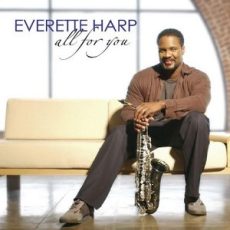
Daily Dose Of Jazz…
Everette Harp was born August 17, 1961 in Houston, Texas and was the youngest of eight children. His mother played the organ and gospel music was one of his earliest influences. He started playing jazz in middle school at Marshall Junior High under the tutelage of drummer Buddy Smith. He attended the High School for Performing and Visual Arts in Houston, then North Texas State University as a music major in the early 1980s.
He worked as an accountant for a short time, and played in local bands, most notably a jazz/funk group called The Franchise which released a 1987 album locally with the first recording of Harp’s There’s Still Hope. 1988 saw him moving to Los Angeles, California and touring briefly with Teena Marie, then Anita Baker.
Two years later George Duke signed him to a contract with Capitol Records to record with his group 101 North. Bruce Lundvall of Blue Note Records signed Harp to a solo contract before the group album was released. Harp’s album was produced by Duke and released by Blue Note in 1992.
Harp appeared at the Montreux Jazz Festival, would go on to appear on The Arsenio Hall Show, on Sax by the Fire, and perform on the theme songs for Entertainment Tonight and Soul Train and shared the stage with President Bill Clinton at the Arkansas Ball in 1992.
Harp has worked with Stanley Clarke, Natalie Cole, Neil Diamond, Aretha Franklin, Wayne Henderson, Al Jarreau, The Jazz Crusaders, Billy Joel, Chaka Khan, Kenny Loggins, Bobby Lyle, Peter Maffay, Marcus Miller, Chante Moore, Dianne Reeves, Eros Ramazzotti, Brenda Russell, Joe Sample, and Luther Vandross.
Saxophonist Everette Harp, who received his first nomination in 2015 for a Grammy Award for Best Contemporary Instrumental Album, continues to perform, compose and record.
More Posts: bandleader,composer,history,instrumental,jazz,music,saxophone
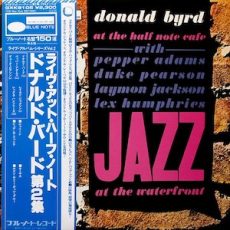
Requisites
Donald Byrd at The Half Note Café, Volume 2 | By Eddie Carter
I enjoyed listening to the first set of Donald Byrd at The Half Note Café so much that I decided to hear the second set as well, which inspired this morning’s discussion. So, as the quintet makes their way back to the stage, let’s all sit back in our seats to enjoy Donald Byrd at The Half Note Café, Volume 2 (Blue Note BLP 4061/BST 84061). Donald Byrd is on trumpet, Pepper Adams is on baritone sax, Duke Pearson is on piano, Laymon Jackson is on bass, and Lex Humphries is on the drums. My copy is the King Record Company Japanese Stereo reissue (Blue Note BST 84061 – GYK-8105).
The rhythm section lays the foundation to begin Jeannine by Duke Pearson with their introduction ahead of the front line’s opening chorus. Donald lights the first solo like a shining beacon. Pepper succeeds him with a briskly exciting performance; then Duke keeps your foot tapping with swinging precision ahead of the ensemble’s closing chorus and trio ending softly. The leader then introduces the group’s theme, Pure D. Funk, before leading the trio through the bluesy theme. Pepper is up first with a relaxing interpretation. Duke has a very fine spot next, and then Donald is as smooth as Tennessee Whiskey preceding the group’s reprise and climax.
Side Two starts with Lex’s percussive introduction to the quintet’s medium melody of Donald’s second tune, Kimyas. Pepper swings easily in an impressive opening statement. Donald follows with another equally blissful gem. Duke completes the solos at a leisurely pace anchored by Laymon and Lex until the quintet’s ending theme. When Sonny Gets Blue by Marvin Fisher and Jack Segal opens with the front line delivering a very pretty opening chorus. Duke gets the song’s only solo and delivers a wonderful expression of incredible beauty and solace, leading to the quintet’s theme restatement. Donald ends the evening by thanking the crowd for being a receptive audience.
Alfred Lion produced this live date, and Rudy Van Gelder was the recording engineer. The sound quality possesses a top-notch soundstage that truly makes you feel like you’re right there in the Half Note Café audience. King Record Company has beautifully remastered the original mono tapes, enhancing the experience. If you’re new to the music of Donald Byrd or only know of his later ’70s jazz-funk releases, I invite you to check out Donald Byrd at The Half Note Café, Volume 2, on your next record hunt. Like its companion, Volume 1, the musicians are wonderful. The music has stood the test of time and both albums are excellent documents of a live jazz performance the listener can revisit anytime!

More Posts: choice,classic,collectible,collector,history,instrumental,jazz,music,trumpet



